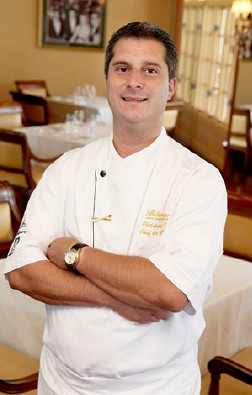he chef told me to go to Guy Martin to start.
That's a heck of a place to start.
Because Marc Veyrat used to be a little crazy chef, you understand, so nobody stay over there. He told me if you go over there and stay two months, it makes no sense. Guy Martin was tough too, but he was more kind.
You trained with some high profile chefs, who gave you a certain perspective of food.
You remember some recipe and after you move them, you transform them, you play with them.
Your first job out of school...
My first job was with Château de Divonne. At the time he went to Paris and I went with him. I worked with him for a few months.
With a chef like that, though he is very technical, he is very conceptual as well. Did you find that working for Guy was more hands-on technical learning or more of 'the love of food' side?
It's difficult to say, at that point in time, I worked small. I tried to learn and maximum I could take. Guy used to find some old, old recipe from (i.e.) Savoy, a very old recipe. Then he'd move them and change them. At the time I was only 18 years old. I tried to learn and maybe in a few months I'd be able to take the station.
Did he change how you look at food at that point?
You don't know any different. You just learn and take it all in. After years and years, you create your own philosophy or where you're going, but not at the beginning.
When did you come to America?
Ten (10) years ago.
Where did you work first here?
Here, La Palme d'Or (Miami, FL), before that St. Maarten.
Why here? You've made a very big mark for yourself?
I left, France, at 22 years old and went to St. Barts in the Caribbean. I spent 3 years over there. I worked at the Francois Plantation Hotel.
What type of cuisine was it?
It was French from a island perspective.
That's a different experience in terms of ingredients. You stayed strictly French in technique but played with the ingredients.
Plus we got some stuff from Europe. Every Wednesday the plane, you know Air France, used to bring European food.
Would you say your style of food is more classical?
Yes
Do you embrace Molecular Gastronomy?
I'm scared of it. Yes, I play with, but I don't do just that. It was Caribbean and French influence.
Use some fish from the Caribbean Sea, you do a French recipe.
You wouldn't say it was fusion though. When it comes down to it, it is French.
You were talking about Molecular Gastronomy.
You said you were scared of it?
Yes, I'm going to tell you why, it's not that I am scared. It was my experience in the Caribbean I used to be the chef at the Francois Plantation Restaurant, used to be the best table of the island. When the chef before me left, I took his position. We have 120-130 different spices, we have a small file cabinet in a room. My job with molecular was to find spices that could go with another. This was about spices. You play with, you know the molecular.
But (the spices) gave a big world influence.
It was not the molecular thing, it was about the spices. All spices came from places around the world. We had a special shop for that. When they found a new spice they would send it to us. So we were working, everyday on that. But the staff was trained for that, we were all European. You put one ounce more or one ounce less and it changes everything. After I left, I went to La Samanna, St. Maarten. I used to be an executive chef over there. Chef de Cuisine and I work on the spice, a little bit less, because we had more international people.
You have to cook for your market.
People from New York used to come every year, a different market then La Samanna. Ten years ago when I came here, the pastry chef who used to work with me at La Samanna, came to work here. After the Chef de Cuisine that was here left, they called me to do a tasting. I did a tasting and they hired me. I said I was going to back, like I used to do before with my spice in my kitchen.
You were able to come in and have carte blanche like you did before.
Yes. But really after I came here, and it is all about with who you work. You can be the best chef in the world, but if you have nobody behind you, to understand what you want to do, to find those who really want to do it. Here, the mentality is maybe 5% really love their job, the rest do it for a paycheck .They are here to work, for the job, to pay bills.
It's very hard to get a team together.
Exactly.
There's a different philosophy. Some chefs want you to be a robot. They want you come in and do what I say, how I say, when I say. Every night you do it the same exact way.
Most you walk in and they give you a book, a recipe, you're here today and that's all you're going to do.
~~This is the end of part 1 of a fascinating conversation with Phillipe. Part two contains more about cooking and the direction of cuisine today.
 Part 1
Part 1 Part 1
Part 1